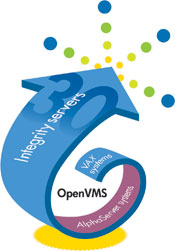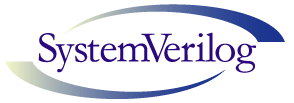A compiler is a computer program that translates computer code written in one programming language into another language. The name compiler is primarily used for programs that translate source code from a high-level programming language to a lower level language to create an executable program.

A Java virtual machine (JVM) is a virtual machine that enables a computer to run Java programs as well as programs written in other languages that are also compiled to Java bytecode. The JVM is detailed by a specification that formally describes what is required in a JVM implementation. Having a specification ensures interoperability of Java programs across different implementations so that program authors using the Java Development Kit (JDK) need not worry about idiosyncrasies of the underlying hardware platform.

OpenVMS is a multi-user, multiprocessing virtual memory-based operating system (OS) designed for use in time-sharing, batch processing, and transaction processing. It was first released by Digital Equipment Corporation in 1977 as VAX/VMS for its series of VAX minicomputers. OpenVMS also runs on DEC Alpha systems and the HP Itanium-based families of computers. OpenVMS is a proprietary operating system, but source code listings are available for purchase.

The LLVM compiler infrastructure project is a set of compiler and toolchain technologies, which can be used to develop a front end for any programming language and a back end for any instruction set architecture. LLVM is designed around a language-independent intermediate representation that serves as a portable, high-level assembly language that can be optimized with a variety of transformations over multiple passes.
Accellera Systems Initiative (Accellera) is a standards organization that supports a mix of user and vendor standards and open interfaces development in the area of electronic design automation (EDA) and integrated circuit (IC) design and manufacturing. It is less constrained than the Institute of Electrical and Electronics Engineers (IEEE) and is therefore the starting place for many standards. Once mature and adopted by the broader community, the standards are usually transferred to the IEEE.

Silvaco Group Inc. develops and markets electronic design automation (EDA) and technology CAD (TCAD) software and semiconductor design IP (SIP). The company is headquartered in Santa Clara, California, and has a global presence with offices located in North America, Europe, and throughout Asia. Since its founding in 1984, Silvaco has grown to become a large privately held EDA company. The company has been known by at least two other names: Silvaco International, and Silvaco Data Systems.
SystemC is a set of C++ classes and macros which provide an event-driven simulation interface. These facilities enable a designer to simulate concurrent processes, each described using plain C++ syntax. SystemC processes can communicate in a simulated real-time environment, using signals of all the datatypes offered by C++, some additional ones offered by the SystemC library, as well as user defined. In certain respects, SystemC deliberately mimics the hardware description languages VHDL and Verilog, but is more aptly described as a system-level modeling language.

SystemVerilog, standardized as IEEE 1800, is a hardware description and hardware verification language used to model, design, simulate, test and implement electronic systems. SystemVerilog is based on Verilog and some extensions, and since 2008 Verilog is now part of the same IEEE standard. It is commonly used in the semiconductor and electronic design industry as an evolution of Verilog.
The Java Modeling Language (JML) is a specification language for Java programs, using Hoare style pre- and postconditions and invariants, that follows the design by contract paradigm. Specifications are written as Java annotation comments to the source files, which hence can be compiled with any Java compiler.
The XAP processor is a RISC processor architecture developed by Cambridge Consultants since 1994. XAP processors are a family of 16-bit and 32-bit cores, all of which are intended for use in an application-specific integrated circuit or ASIC chip design. XAP processors were designed for use in mixed-signal integrated circuits for sensor or wireless applications including Bluetooth, ZigBee, GPS, RFID or Near Field Communication chips. Typically these integrated circuits are used in low cost, high volume products that are battery-powered and must have low energy consumption. There are other applications where XAP processors have been used to good effect, such as wireless sensor networks and medical devices, e.g. hearing aids.
Intel C++ Compiler, also known as icc or icl, is a group of C and C++ compilers from Intel available for Windows, Mac, Linux, FreeBSD and Intel-based Android devices.
This is a comparison of notable free and open-source configuration management software, suitable for tasks like server configuration, orchestration and infrastructure as code typically performed by a system administrator.
Aldec, Inc. is a privately owned electronic design automation company based in Henderson, Nevada that provides software and hardware used in creation and verification of digital designs targeting FPGA and ASIC technologies.
Unified Power Format (UPF) is the popular name of the Institute of Electrical and Electronics Engineers (IEEE) standard for specifying power intent in power optimization of electronic design automation. The IEEE 1801-2009 release of the standard was based on a donation from the Accellera organization. The current release is IEEE 1801-2018.
IP-XACT is an XML format that defines and describes individual, re-usable electronic circuit designs to facilitate their use in creating integrated circuits. IP-XACT was created by the SPIRIT Consortium as a standard to enable automated configuration and integration through tools.
Duolog Technologies was an Irish-based company that developed electronic design automation tools that assist with the integration of complex System-on-Chip(SoC), ASIC and FPGA designs. In 2014, Duolog was acquired by ARM Holdings plc, a multinational semiconductor and software design company headquartered in Cambridge, United Kingdom.

Unix is a family of multitasking, multiuser computer operating systems that derive from the original AT&T Unix, development starting in the 1970s at the Bell Labs research center by Ken Thompson, Dennis Ritchie, and others.

Verilator is a free and open-source software tool which converts Verilog to a cycle-accurate behavioral model in C++ or SystemC. It is restricted to modeling the synthesizable subset of Verilog and the generated models are cycle-accurate, 2-state, with synthesis semantics. As a consequence, the models typically offer higher performance than the more widely used event-driven simulators, which can process the entire Verilog language and model behavior within the clock cycle. Verilator is now used within academic research, open source projects and for commercial semiconductor development. It is part of the growing body of free EDA software.

Haskell is a statically typed, purely functional programming language with type inference and lazy evaluation. Type classes, which enable type-safe operator overloading, were first proposed by Philip Wadler and Stephen Blott for Standard ML and implemented later in Haskell. Its main implementation is the Glasgow Haskell Compiler. It is named after logician Haskell Curry.

Vivado Design Suite is a software suite produced by Xilinx for synthesis and analysis of HDL designs, superseding Xilinx ISE with additional features for system on a chip development and high-level synthesis. Vivado represents a ground-up rewrite and re-thinking of the entire design flow, and has been described by reviewers as "well conceived, tightly integrated, blazing fast, scalable, maintainable, and intuitive".








